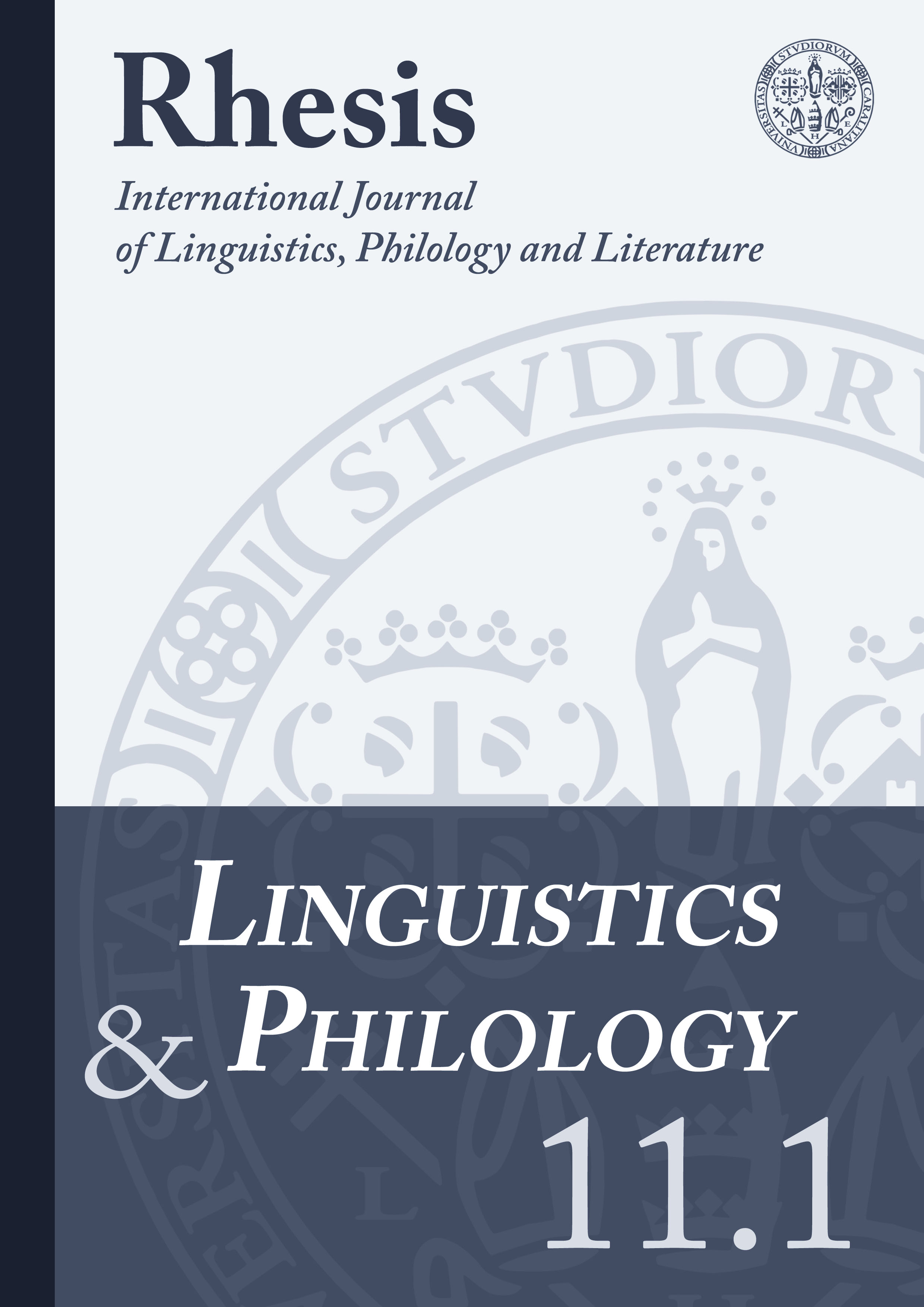Πυθαγορισµοί e retorica: il trattamento dei filosofi pitagorici in due frammenti comici di IV secolo a.C. (Cratin. Iun. fr. 7 e Alex. fr. 223 K.-A.)
Abstract
Philosophers are among the most typical targets of fourth-century Attic Comedy, especially Pythagoreans who, as several fragments show, were frequently mocked on the Athenian stage. In two comic fragments, however, they are surprisingly mocked for their rhetorical skills and this characterisation does not seem to find confirmation in other sources. The first of these fragments is Cratinus the Younger’s fr. 7 K.-A. (from the comedy Men from Tarentum), where a speaker describes the Pythagoreans’ manipulative ethos. They are said to confuse the ordinary people with ‘antithesis, long-winded sentences, and a high-flown style’. The same rhetorical and manipulative inclination is ascribed to them in Alexis’ fr. 223 K.-A. (from a comedy also entitled Men from Tarentum). The present paper aims at analysing these two comic fragments in the context of Athenian comic production and the origin of the idea about the Pythagoreans’ interest in rhetoric and manipulation of words. I shall investigate to what extent this comic topos is connected with the Pythagorean sect from Tarentum (after which both comedies are named), or whether this trait is inherited from the stereotypical portrait of philosophers in comedy.
Downloads
References
Arnott, W. Geoffrey (1996), Alexis. The Fragments. A Commentary, Cambridge, Cambridge University Press.
Austin, Colin; Olson, S. Douglas (2004), Aristophanes. Thesmophoriazusae. Edited with Introduction and Commentary, Oxford, Oxford University Press.
Battezzato, Luigi (2008), ‘Pythagorean Comedies from Epicharmus to Alexis’, Aevum Antiquum n.s. 8, 139-164.
Burkert, Walter (1972), Lore and Science in Ancient Pythagoreanism, Cambridge Mass., Harvard University Press.
Caroli, Menico (2014), Cratino il Giovane e Ofelione poeti della commedia di mezzo. Edizione critica e commento, con un’appendice su Cratino il Giovane nei Fragmenta Poetarum Graecorum di Dirk Canter, Bari, Levante Editori.
Centrone, Bruno (2000), ‘Pseudo-Hippodamos de Milet’, in Goulet, Richard (éd.), Dictionnaire des Philosophes Antiques. D’Eccélos à Juvenál, 3, Paris, CNRS Éditions, 790-791.
Champion, Craige B. (2010), ‘Timaios (566)’, in Worthington, Ian (ed.), Brill’s New Jacoby,
Delatte, Armand (19792) [1922], Essai sur la politique pythagoricienne, Genève, Slatkine Reprints.
Denniston, John D. (1927), ‘Technical Terms in Aristophanes’, The Classical Quarterly 21 (3-4), 113-121.
Dover, Kenneth James (1968), Aristophanes Clouds. Edited with Introduction and Commentary, Oxford, Clarendon Press.
Dover, Kenneth James (1993), Aristophanes Frogs. Edited with Introduction and Commentary, Oxford, Clarendon Press.
Edmonds, John Maxwell (1959), The Fragments of Attic Comedy after Meineke, Bergk, and Kock, 2, Leiden, Brill.
Gow, Andrew S. F.; Page, Denys L. (eds.) (1965), The Greek Anthology. Hellenistic Epigrams. Commentary and Indexes, 2, Cambridge, Cambridge University Press.
Greco, Emanuele (1999), ‘Turi’, in Greco, Emanuele (ed.), La città greca antica. Istituzioni, società e forme urbane, Roma, Donzelli editore, 413-430.
Horky, Philip Sidney (2013), Plato and Pythagoreanism, Oxford, Oxford University Press.
Huffman, Carl A. (2005), Archytas of Tarentum. Pythagorean, Philosopher and Mathematician King, Cambridge, Cambridge University Press.
Hunter, Richard L. (1983), Eubulus. The Fragments, Cambridge, Cambridge University Press.
Imperio, Olimpia (1998), ‘La figura dell’intellettuale nella commedia greca’, in Belardinelli, Anna Maria; Imperio, Olimpia; Mastromarco, Giuseppe; Pellegrino, Matteo; Totaro, Piero (eds.), Tessere. Frammenti della commedia greca: studi e commenti, Bari, Adriatica, 43-130.
Kock, Theodor (1884), Comicorum atticorum fragmenta. Novae comoediae fragmenta, 2, Lipsiae, B. G. Teubneri.
Lana, Italo (1949), ‘I frammenti del Pseudo Ippodamo Pitagorico’, Rivista di filosofia 50, 315-331.
Marzullo, Benedetto (1993), I sofismi di Prometeo, Pisa, La Nuova Italia Editrice.
Mastellari, Virginia (2020), Eubulides – Mnesimachos. Introduzione, traduzione, commento, Göttingen, Vandenhoeck & Ruprecht.
Mastromarco, Giuseppe (1983), Commedie di Aristofane, 1, Torino, UTET.
Mastromarco, Giuseppe; Totaro, Piero (2006), Commedie di Aristofane, 2, Torino, UTET.
Melero Bellido, Antonio (1972), Atenas y el Pitagorismo. Investigación en las fuentes de la comedia, Salamanca, Universidad de Salamanca.
Muccioli, Federicomaria (2002), ‘Pitagora e i Pitagorici nella tradizione antica’, in Vattuone, Riccardo (ed.), Storici greci d’Occidente, Bologna, Il Mulino, 341-409.
Newiger, Hans-Joachim (1957), Metapher und Allegorie. Studien zu Aristophanes, München, Beck.
Novo Taragna, Sandra (1994), ‘Alessi e il Pitagorismo (fr. 223 K.-A.)’, in Barberi Squarotti, Giorgio; Cortassa, Guido; Gallicet, Ezio; Maltese, Enrico V.; Mazzucco, Clementina; Vincenti, Eleonora (eds.), Voce di molte acque. Miscellanea di studi offerti a Eugenio Corsini, Torino, S. Zamorani, 119-127.
Oliva, Carlo (1968), ‘La parodia e la critica letteraria nella commedia postaristofanea’, Dioniso 62, 25-92.
Olson, S. Douglas (2002), Aristophanes. Acharnians. Edited with Introduction and Commentary, Oxford, Oxford University Press.
Olson, S. Douglas (2007), Broken Laughter. Select Fragments of Greek Comedy, Oxford, Oxford University Press.
Peppler, Charles W. (1910), ‘The Termination -κός as used by Aristophanes for Comic Effect’, The American Journal of Philology 31 (4), 428-444.
Prince, Susan (2015), Antisthenes of Athens. Texts, Translations, and Commentary, Ann Arbor, University of Michigan Press.
Riedweg, Christoph (2002), Pythagoras. Leben, Lehre, Nachwirkung. Eine Einführung, München, Beck.
Rostagni, Augusto (1922), ‘Un nuovo capitolo della storia della retorica e della sofistica’, Studi Italiani di Filologia Classica 2, 148-210.
Sanchis Llopis, Jorge Luis (1995), ‘Los pitagóricos en la Comedia Media: parodia filosófica y comedia de tipos’, Habis 26, 67-82.
Stama, Felice (2016), Alessi. Testimonianze e frammenti. Testo, traduzione e commento, Castrovillari, Edizioni AICC.
Vattuone, Riccardo (1991), Sapienza d’Occidente. Il pensiero storico di Timeo di Tauromenio, Bologna, Pàtron.
Webster, Thomas B. L. (19702) [1953], Studies in Later Greek Comedy, Manchester-New York, Manchester University Press-Barnes & Noble Inc.
Weiher, Anton (1913), Philosophen und Philosophenspott in der attischen Komödie, München, K. Ludwig-Maximilians-Universität München Dissertation.
Willi, Andreas (2003), The Languages of Aristophanes. Aspects of Linguistic Variation in Classical Attic Greek, Oxford, Oxford University Press.
Willi, Andreas (2012), Challenging Authority: Epicharmus between Epic and Rhetoric, in Bosher, Kathryn (ed.), Theater outside Athens: Drama in Greek Sicily and South Italy, Cambridge, Cambridge University Press, 56-75.
Zanetto, Giuseppe (2010), ‘I filosofi a teatro? Fanno ridere. Le Nuvole di Aristofane’, in Costazza, Alessandro (ed.), La filosofia a teatro, Milano, Cisalpino, 135-150.
Zhmud, Leonid (2012), Pythagoras and the Early Pythagoreans, Oxford, Oxford University Press.
Zhmud, Leonid (2014), ‘Sixth-, Fifth- and Fourth-century Pythagoreans’, in Huffman, Carl A. (ed.), A History of Pythagoreanism, Cambridge, Cambridge University Press, 88-111.



